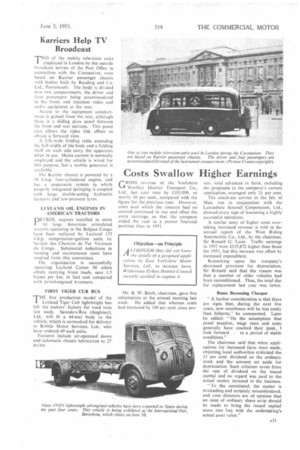Costs Swallow Higher Earnings
Page 33

If you've noticed an error in this article please click here to report it so we can fix it.
("ROSS revenue of the Yorkshire \--I Woollen District Transport Co., Ltd., last year rose by £103,000. or nearly 10 per cent., compared with the figure for the previous year. however, costs over which the concern had no control continued to rise and offset the extra earnings, so that the company ended the year in a poorer Tinanetal position than in 1951.
Mr. R. W. Birch, chairman, gave this information at the annual meeting last week. He added that whereas costs had increased by 140 per cent, since pre war. total advances in fares, Including the proposals in the company's current application, averaged only 21 per cent. The coach-air service to the Isle of Man, run in conjunction with the Lancashire Aircraft Corporation, Ltd., showed every sign of becoming a highly successful operation. A similar story of higher costs overtaking increased revenue is told in the annual report of the West Riding Automobile Co., Ltd., by the chairman, Sir Ronald G. Leon. Traffic earnings in 1952 were £135,872 higher than those for 1951, but this increase was offset by increased expenditure. Remarking upon the company's decreased provision for depreciation, Sir Ronald said that the reason was that a number of older vehicles had been reconditioned. Thus, the total due for replacement last year was lower.
Buses Becoming Cheaper
"A further consideration is that there are signs that, during the next few years, new omnibuses will be less costly than hitherto," he commented. Later he added: "On the assumption that penal taxation, wage rates and costs generally have reached their 'peak, I look forward . . to a period of stable conditions." The chairman said that when applications for increased fares were made, objecting local authorities criticized the 15 per cent, dividend on the ordinary
stock and the amount set aside for depreciation. Such criticism arose from the rate of dividend on the issued capital and no regard was paid to the actual money invested in the business.
"To the uninitiated, the matter is misleading and certainly misunderstood, and your directors are of opinion that an issue of ordinary share scrip should be made to bring the issued capital more into line with the undertaking's actual asset value."
































































































